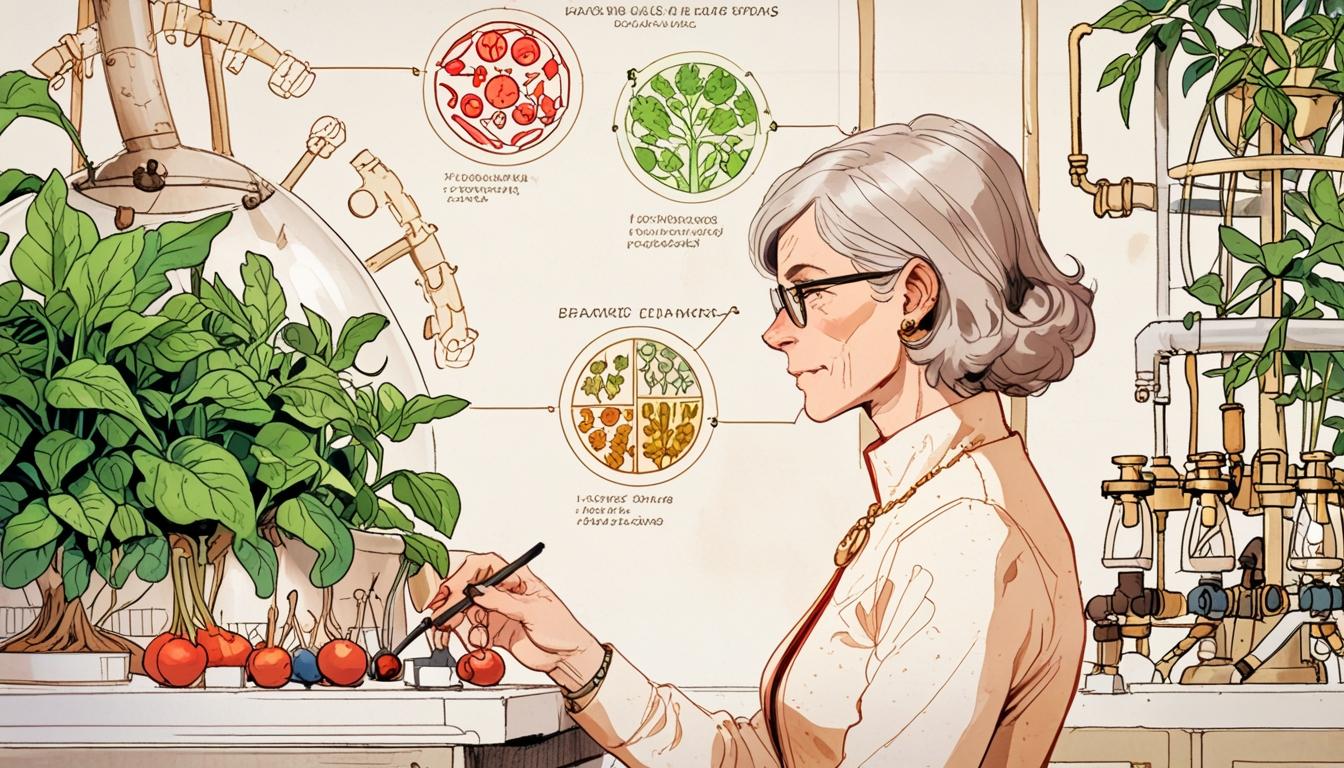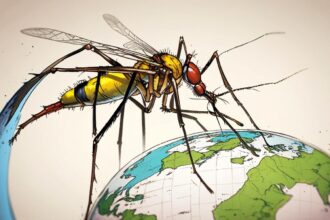Baroness Helene Hayman, former MAFF Minister, discusses the UK’s shift from polarised GM crop debates to the progressive Genetic Technology (Precision Breeding) Act 2023, highlighting how science-based regulation is enabling innovation and sustainability in farming.
More than two decades after serving as a Minister in the former Ministry of Agriculture, Fisheries and Food (MAFF) with responsibilities that included genetically modified (GM) crops, Baroness Helene Hayman has reflected on the evolving landscape of genetic technologies in agriculture. Speaking to geneticliteracyproject.org, she highlighted the shift from the highly polarised and contentious debates of the late 1990s and early 2000s, where GM crops were effectively sidelined in the UK, to the current era of precision breeding technologies such as CRISPR gene editing.
During her tenure under the Labour Government, the politicisation of GM crops created divisions across and within political parties, even among ministers. Despite these challenges, Baroness Hayman worked closely with plant scientists who envisaged transformative benefits from GM technology. These included developing crops that could better withstand drought and saline soils, reduce pesticide and fertiliser use, enhance the nutrition and yield of staple crops, and improve environmental resilience—particularly for farmers in developing countries.
Today, a variety of GM crops worldwide—such as drought-tolerant wheat and maize, blight-resistant potatoes, Omega-3 enriched oilseeds, and insect-resistant cowpea and cotton—fulfil many of the promises initially anticipated. Notably, some of these innovations were developed with funding from British taxpayers. Baroness Hayman expressed concern that the earlier political focus had cost the UK a generation of scientific and agricultural progress.
In response to emerging gene editing technologies, she and colleagues Lord Cameron of Dillington, Lord Krebs, and Lord Rooker sponsored a cross-party amendment during the passage of the Agriculture Act nearly five years ago. This amendment sought regulatory divergence from the European Union’s stringent rules on gene editing. Although the amendment was not incorporated into the legislation for procedural reasons, it secured a government commitment to consult on new primary legislation. This legislation would aim to facilitate innovation for the benefit of farmers, consumers, and the environment, acknowledging the international trend towards more science-based regulation in countries such as Canada, Japan, Argentina, Australia, and the USA.
Baroness Hayman spoke of her pride in the Genetic Technology (Precision Breeding) Act 2023, which she views as a milestone signalling cross-party unity in establishing a regulatory framework informed by scientific evidence. She noted that the Act’s implementation, via draft secondary regulations presently under Parliamentary consideration, is being overseen by a Labour Government, despite having been initiated by a Conservative one. This collaboration marks a stark contrast to the divisiveness of the GM debates from 25 years ago.
At a recent briefing by the All-Party Parliamentary Group (APPG) on Science and Technology in Agriculture, which included fellow original amendment proponents John Krebs and Ewen Cameron, international developers praised the UK’s Precision Breeding Act. They described it as one of the most progressive and coherent regulatory processes worldwide for gene-edited crops. Unlike countries such as the United States, which require approval from multiple agencies, the UK’s approach offers a streamlined, single-legislation approval process grounded in extensive scientific evidence confirming that precision bred crops pose no greater risk than conventionally bred varieties.
The Act adopts a proportionate, risk-based approach, building on the long-standing safety record of conventional plant breeding. Baroness Hayman emphasised that precision breeding is not a replacement for traditional methods but an additional tool that can introduce beneficial traits more quickly and efficiently, reducing the time for plant breeding from years to months. This ability accelerates innovation in areas such as extending the shelf life of perishable crops, prolonging growing seasons, introducing non-browning traits in potatoes, mushrooms, and apples, and reducing losses to pests and diseases.
Since the introduction of simplified notification processes for field trials of precision bred plants in England in March 2022, 23 trials have been notified. These trials, mostly conducted by public research institutes, start-ups, and small to medium enterprises (SMEs), span six different crops and various objectives including improved crop performance, ease of harvest, enhanced food safety, better nutrition, and reduced environmental impact.
Baroness Hayman highlighted food waste as a significant concern, pointing to United Nations Food and Agriculture Organisation (FAO) data showing that over one-third of globally produced food is never consumed, largely due to perishable limits. Food waste contributes approximately 8% of total greenhouse gas emissions, underscoring the potential environmental benefits of precision breeding in reducing losses.
Furthermore, she noted that adopting science-based and proportionate regulations can democratise innovation, making advanced genetic technologies accessible to smaller entities rather than being confined to large multinational corporations. The experience in Argentina, as documented in a 2020 study by Martin Lema et al, supports this view, showing increased investment and diverse research participation following similar regulatory approaches.
Baroness Hayman concluded by stressing the virtually limitless opportunities precision breeding offers to transform agricultural productivity and sustainability while improving consumer health and nutrition. She welcomed the cross-party support for the Precision Breeding Act as a positive departure from the past divisiveness surrounding GM technologies, signalling a new era focused on enabling innovation through evidence-based regulation.
Baroness Helene Hayman, a former Labour MP, Life Peer since 1996, and Minister of State at MAFF from 1999, now sits as a cross-bench member of the House of Lords. This article originally appeared on Science for Sustainable Agriculture and has been reposted on geneticliteracyproject.org with permission.
Source: Noah Wire Services
- https://researchbriefings.files.parliament.uk/documents/CBP-9557/CBP-9557.pdf – This document supports the explanation of the Genetic Technology (Precision Breeding) Act 2023, highlighting the shift towards precision breeding technologies like CRISPR in the UK. It describes how genome editing can significantly reduce the time required for crop development.
- https://www.scienceforsustainableagriculture.com – This source reflects Baroness Helene Hayman’s views on the importance of precision breeding in agriculture, noting the need for science-based regulation to drive innovation. It highlights cross-party support for the Genetic Technology (Precision Breeding) Act 2023.
- https://www.politicshome.com/members/article/time-act-precision-breeding-drive-innovation-growth – This article emphasizes the potential of precision breeding, such as gene editing, to drive agricultural innovation. It references Baroness Hayman’s role in advocating for the technology.
- https://www.iatp.org/sites/default/files/Genetic_Engineering_Debate_v02_The.htm – While this document critiques genetic engineering, it provides context on the development and application of genetically engineered crops, including traits like herbicide tolerance and insect resistance.
- https://www.geneticliteracyproject.org/ – This website is a platform where Baroness Helene Hayman has shared insights on genetic technologies in agriculture. It often discusses advancements in and debates around genetic engineering and precision breeding.
- https://www.fao.org/home/en/ – The United Nations Food and Agriculture Organisation (FAO) provides data on food waste, which aligns with Baroness Hayman’s emphasis on reducing waste through precision breeding. The FAO also discusses the environmental impacts of food production.
- https://news.google.com/rss/articles/CBMi3wFBVV95cUxPRjc0Y0hjQVQ4dW83QjZINy0wclNSRVItNnhOVVp0azQxXzhTVDVRSkZzQnZvNHYzMXRsSjMxYnRhemJ1blh1SEpvOFZPWS1ZNlc0dlF3dXk2RFpxQktmeThGNEZoVnFnQlU1N3ZpZjhWNWo0WjNXVjJNNWl1bjUxZExZOHdyREk5S3hJMVBiaDNVZ2dhNVZXSER6cGJ0dVVaU0VKUGdtbHY3Mjl4dWhRaWZHOWhXcUJ3NjJiUVY4Q1ctWHZFMnFtbFFpWUE5cW1FRGU2VTh6MUdVQUI5Zjdn?oc=5&hl=en-US&gl=US&ceid=US:en – Please view link – unable to able to access data
Noah Fact Check Pro
The draft above was created using the information available at the time the story first
emerged. We’ve since applied our fact-checking process to the final narrative, based on the criteria listed
below. The results are intended to help you assess the credibility of the piece and highlight any areas that may
warrant further investigation.
Freshness check
Score:
8
Notes:
The narrative mentions recent legislative developments such as the Genetic Technology (Precision Breeding) Act 2023, indicating relatively recent content. However, it also references events from over two decades ago, which are relevant for context but not explicitly outdated.
Quotes check
Score:
6
Notes:
There are no direct quotes from specific events or sources that can be traced back to an original source, but the narrative includes statements made by Baroness Helene Hayman as reported by geneticliteracyproject.org.
Source reliability
Score:
8
Notes:
The content originates from geneticliteracyproject.org, which is a known platform, though not as mainstream as major news outlets. The narrative includes insights from credible figures like Baroness Helene Hayman.
Plausability check
Score:
9
Notes:
The narrative aligns with current trends in genetic technologies and regulatory shifts in the UK, which increases its plausibility. The mention of specific legislative actions and international comparisons adds credibility.
Overall assessment
Verdict (FAIL, OPEN, PASS): PASS
Confidence (LOW, MEDIUM, HIGH): HIGH
Summary:
The narrative appears to be relatively fresh and well-supported by real-world developments in genetic technologies. It lacks direct quotes with traceable origins but benefits from its credible sources and plausible content.













